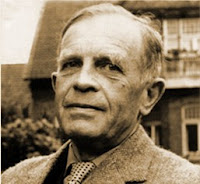Neuroscience wants to be the answer to everything. It isn’t., by Roger Scruton
There are many reasons for believing the brain is the seat of consciousness. Damage to the brain disrupts our mental processes; specific parts of the brain seem connected to specific mental capacities; and the nervous system, to which we owe movement, perception, sensation and bodily awareness, is a tangled mass of pathways, all of which end in the brain. This much was obvious to Hippocrates. Even Descartes, who believed in a radical divide between soul and body, acknowledged the special role of the brain in tying them together.
The discovery of brain imaging techniques has given rise to the belief that we can look at people’s thoughts and feelings, and see how ‘information’ is ‘processed’ in the head. The brain is seen as a computer, ‘hardwired’ by evolution to deal with the long vanished problems of our hunter-gatherer ancestors, and operating in ways that are more transparent to the person with the scanner than to the person being scanned. Our own way of understanding ourselves must therefore be replaced by neuroscience, which rejects the whole enterprise of a specifically ‘humane’ understanding of the human condition.
In 1986 Patricia Churchland published Neurophilosophy, arguing that the questions that had been discussed to no effect by philosophers over many centuries would be solved once they were rephrased as questions of neuroscience. This was the first major outbreak of a new academic disease, which one might call ‘neuroenvy’. If philosophy could be replaced by neuroscience, why not the rest of the humanities, which had been wallowing in a methodless swamp for far too long? Old disciplines that relied on critical judgment and cultural immersion could be given a scientific gloss when rebranded as ‘neuroethics’, ‘neuroaesthetics’, ‘neuromusicology’, ‘neurotheology’, or ‘neuroarthistory’ (subject of a book by John Onians). Michael Gazzaniga’s influential study, The Ethical Brain, of 2005, has given rise to ‘Law and Neuroscience’ as an academic discipline, combining legal reasoning and brain imagining, largely to the detriment of our old ideas of responsibility. One by one, real but non-scientific disciplines are being rebranded as infant sciences, even though the only science involved has as yet little or nothing to say about them.
Read the complete article in CERC.
On Georgetown and the Essential Unity of All Knowledge, by James V. Schall, S.J.
In its editorial occasioned by Georgetown University’s invitation to Kathleen Sebelius—a Catholic, who is engineering the requirement that Catholic institutions must provide services to any employee, even if they include things contrary to conscience, faith, and reason—the Catholic Standard (May 10) called the invitation disappointing “but not surprising.” Though this statement is rather blunt, it is probably too mild in light of the damage the invitation causes. It is more than “disappointing,” though it is indeed no “surprise.”
The distance that many Catholic universities are perceived to have moved from Catholicism is, for many, illustrated by the publicity of this invitation. Honoring the person who intends to shut one’s institution down unless it conforms to laws that deny religious liberty and human intelligence seems, at best, dubious.
The best background “theory” about why Sebelius was interested in this invitation is that the Obama administration does not think it can win the election if people are reminded of the economy. Thus, effort is made to shift attention to what are called “moral” issues, a euphemism for the use of “rights” to redefine the whole field of public life. Obama’s advocacy of gay-marriage also falls into this category. The administration understands the value of splitting the religious vote between those who stand for Christian teachings and practices and those who reject them but insist on changing the Church to conform to the secular pattern. However many can be enticed by this tactic may be enough at the polls to win reelection. The only bad prince, as Machiavelli put it, is one who loses power.
The Church would expect, at a time when its liberty of mission and action is threatened by specific governmental decree, that universities, not just Catholic ones, would be the first to come to its aid. But they seem to be the last. They appear mostly indifferent to what has been probably the most unique of American legal innovations about the relation of religion and government. The Sebelius invitation, from the outside, seems an indifference to the Church by those who would be most expected to support her on the grounds of intelligence itself.
The issue is whether universities called “Catholic” have not become rather secular with vague religious symbols still about but no substantial connection with what it is to be Catholic in reason and intelligence. The bishops, for all their courage in facing this question, have not addressed the factual question about what is the actual orientation of universities that are called “Catholic” for whatever reason.
II.
Meanwhile, Pope Benedict XVI has been speaking to various groups of the American hierarchy on their periodic visits to Rome to report on the status of the local Church. To the final group of visiting American bishops, the pope spoke of education. “Catholic colleges and universities need to reaffirm their distinctive identity in fidelity to their founding ideals and the Church’s mission in service of the Gospel,” Benedict observed. Obviously, Benedict knows that both the identity and fidelity are in serious question in many if not most universities. The universities are not doing what might be expected of them. The pope tells the bishops, however, that “the schools remain an essential resource for the new evangelization” He acknowledges that they should be better recognized and supported.
“It is no exaggeration to say that providing young people with a sound education in the faith represents the most urgent internal challenge facing the Catholic community in your country.” The young, in fact, have a “right to encounter the faith in all its beauty, its intellectual richness and its radical demands.” One would be hard-pressed to say that the young are so presented with this fullness in many of our schools.
Education is directed both to minds and hearts. “The question of Catholic identity, not least at the university level, entails much more than the teaching of religion or the mere presence of a chaplaincy on campus.” The pope is direct. “Catholic schools and colleges have failed to challenge students to re-appropriate their faith as part of the exciting intellectual discovery which mark the experience of higher education.” The pope himself clearly understands the excitement of intellect, an excitement enhanced and elevated by revelation directed to reason. The harmony of faith and reason should guide our life-long “pursuit of knowledge and virtue.” In this endeavor, teachers and professors are vital. This fact underscores the issue of who is hired and by what criterion. If it is only a secular criterion, the school will soon be secular. The “splendor” of truth, both human and divine, needs to be seen in the teachers themselves.
By its nature, faith incites us to know the fullness of truth that includes what Christ revealed. And who is Christ? “He is the creative Logos in whom things were made and in whom all reality ‘holds together.’” Christ is the new Adam who reveals “the whole truth of man,” a phrase that Bl. John Paul II used to love. The pope here repeats a title that is proper to Christ, something that he discussed in his Jesus of Nazareth. Christ is the new Adam “who reveals the ultimate truth about man and the world in which we live.”
Read the complete article in Catholic World Report
Le crime d’être de droite, by Chantal Delsol
Combien ont applaudi à voir un gouvernement mettre en place le service minimum en période de grève ! Combien ont applaudi en voyant que pour la première fois, depuis aussi loin que remonte le regard, un gouvernement ne se couche pas devant la première manifestation venue, mais poursuit ses réformes sans s’évanouir au bruit de la rue.
On pourrait multiplier les exemples. En dépit des promesses non tenues, des atermoiements, des rodomontades, la teneur de droite du gouvernement Sarkozy n’est pas à démontrer.
Ce n’est pas que nous n’ayons pas eu auparavant de gouvernements de droite. Depuis la Seconde Guerre, nous en avons eu pléthore, au contraire. Cependant, la droite jusqu’alors faisait tout pour ressembler à la gauche (le mot “droite”, jusqu’à la fin du XXe siècle, en France, n’était prononcé que comme injure), et d’ailleurs elle lui ressemblait en effet. Il n’est que de voir les restes : que Jacques Chirac, ancien président de “droite”, et sa fille Claude, qui était sa conseillère majeure à l’Élysée, fassent campagne pour François Hollande, cela est parfaitement normal. Nous avions donc une alternance, mais qui ne l’était que pour l’effet d’annonce, et j’allais dire pour la frime. En réalité, tous les présidents étaient de gauche, plus ou moins, et ce, d’autant plus facilement que la gauche longtemps était d’extrême gauche, il suffisait donc à la droite d’être un peu moins de gauche… Mais enfin, aucun gouvernement n’aurait osé résister aux manifestations ou instaurer un service minimum face aux grèves générales qui rendaient le pays exsangue : c’eût été fasciste.
Alors, si les gouvernements n’osaient être de droite, et si une grande partie du pays l’était, pourquoi Nicolas Sarkozy, déployant une politique clairement de droite, se trouve-t-il si récusé ? Pourquoi vote-t-on pour lui en se bouchant le nez ?
La gauche française a été épouvantée de voir un gouvernement énoncer clairement des idées de droite sans traîner derrière lui la casserole fasciste. C’était un démenti à toute la normalité politique française. Comme 80 % de nos médias sont de gauche ou d’extrême gauche, ce gouvernement a été tiré à la manière d’une cible à la foire, ce d’autant plus facilement qu’il a accumulé les erreurs, les sottises, les forfanteries, les gamineries.
En France, être de gauche coule de source, c’est une normalité, une vertu, une thébaïde ; être de droite sonne faux, ou ce n’est pas sérieux, cela sent le crottin, que sais-je. On ne vous pardonnera rien si vous êtes de droite. Ayez la faiblesse de vous mettre en colère dans une émission de radio, si vous êtes de droite, les journalistes diront d’un air entendu : « CQFD, c’est un extrémiste. » Et si vous êtes de gauche, ils diront : « Quel mauvais caractère ! »
Chaque courant de pensée a ses excès et ses défauts. Si l’on veut simplifier, on dira que la gauche est hypocrite (parce que récusant la réalité, il faut bien qu’elle la réintroduise en cachette) et la droite cynique (parce qu’acceptant la réalité, elle a tendance à la justifier sous ses mauvais aspects). La droite aime l’argent ni plus ni moins que la gauche, mais elle ne craint pas de le dire, voilà toute la différence. La gauche bobo offre un faux visage d’austérité. La droite étale. Et c’est cela qui est insupportable. D’où l’histoire du Fouquet’s. Seule la gauche peut étaler son argent, car elle n’est pas suspectée de l’aimer, on croira toujours qu’elle consomme par devoir d’État. On dira que c’est injuste, non, c’est simplement partisan, et au lieu de se lamenter sur le traitement qui est réservé aux uns et aux autres, mieux vaudrait prendre acte de la réalité française : pour mener un combat d’idées à droite, il faut être plus prudent, plus sérieux, j’allais dire plus vertueux qu’à gauche, afin de compenser le déluge critique des médias, seul pouvoir sans contre-pouvoir, donc discrétionnaire.
Ce qui explique que le premier président français vraiment de droite depuis la guerre, et se disant tel, se soit fait littéralement écharper : il a cru qu’il pouvait se contenter d’être ce que sont les politiques – vaniteux, un rien flambeurs, plutôt brouillés avec la vérité ; et il a cru qu’on allait le prendre tel qu’il était avec son caractère et son éducation – désinvolte et parfois malappris, il faut le dire. Mais non, cela ne marche pas. Pour pouvoir annoncer le service minimum ou résister aux manifestations sans se faire écharper, il faudrait beaucoup de tact, une probité sans faille, une indulgence très haute, autrement dit être inattaquable. Si l’on veut prendre un autre exemple : la majorité des Français a tout à fait conscience qu’au nom de la justice sociale on a développé l’assistance de façon anarchique et dommageable pour les prestataires eux-mêmes. Mais jeter dans la mare, à dix jours du deuxième tour, l’idée d’un 1er Mai du “vrai travail” est une provocation malvenue et inutile, parce qu’elle va immédiatement se retourner contre l’idée même qu’elle était censée servir.
Il ne suffit pas d’exprimer des convictions. Faut-il encore avoir le comportement qui répond à la situation. Les convictions seront-elles balayées par le comportement ?
Read the article in Valeurs Actuelles
Russell Kirk and the Swords of Imagination, by Darrin Moore
The battle for our future is being fought within the imaginations of men. This has always been so. Russell Kirk explained: “All great systems, ethical or political, attain their ascendency over the minds of men by virtue of their appeal to the imagination; and when they cease to touch the chords of wonder and mystery and hope, their power is lost, and men look elsewhere for some set of principles by which they may be guided.” Today, with atheistic secular humanitarianism large and in charge, many fear that we may fall prey to immoral forces; avarice, envy and tyranny.
Being encoded by our Creator with free will, human beings have the capacity for both great good and horrendous evil. Man can rise to the level just below angels or sink to the depths just above the animals. Whether he slides into degraded savagery or soars with elegant eagles depends on his reasoning and his will–and these are shaped by his imagination. The ‘moral imagination’ is, in Kirk’s phrase, “a man’s power to perceive ethical truth, abiding law in the seeming chaos of many events. Without the moral imagination, man would live merely from day to day, or rather from moment to moment, as dogs do. It is a strange faculty—inexplicable if men are assumed to have an animal nature only—of discerning greatness, justice, and order, beyond the bars of appetite and self-interest.” Chuck Colson added, “The moral imagination is more than rational, it is poetic, stirring long-atrophied faculties for nobility, compassion and virtue. . . It begins with awe, reverence and appreciation for order within creation. It sees the value of tradition, revelation, family, and community, and responds with duty, commitment and dedication.”
Competing with the moral imagination are three deviant imaginations. The first is the idyllic imagination which believes that man can emancipate himself from all duty, honor, decorum, and standards and simply escape into an endless stream of exciting sensation and sensuality. The idyllic imagination is utopian and materialistic. It falsely believes that if we could simply construct the correct set of laws, it wouldn’t matter whether men were good or bad.
Vigen Guroian adds a closely related second; the idolatrous imagination, which turns vanity into virtue and fixates on famous false heroes from sports, music, movie and television who’re often prepackaged and piped into our culture by mass marketing. Rather than innocently enjoying these entertainments in their proper perspective, obsessions with ‘the cult of the colossal’ crowd out not only worthy heroes, but also lost is valuable leisure time in which an individual’s genuine and optimal personality can be cultivated.
Once an individual becomes bored or disillusioned with the idyllic and idolatrous imaginations, the diabolical imagination often takes hold. Its works can be seen on prime time television pandering “to the lust for violence, destruction, cruelty, and sensational disorder.”
Edmund Burke first mentioned ‘the moral imagination’ in a passage that is apropos: “All the decent drapery of life is to be rudely torn off. All the superadded ideas, furnished from the wardrobe of a moral imagination, which the heart owns, and the understanding ratifies, as necessary to cover the defects of our naked shivering nature, and to raise it to dignity in our own estimation, are to be exploded as a ridiculous, absurd, and antiquated fashion.”
Read the complete article in The Imaginative Conservative




